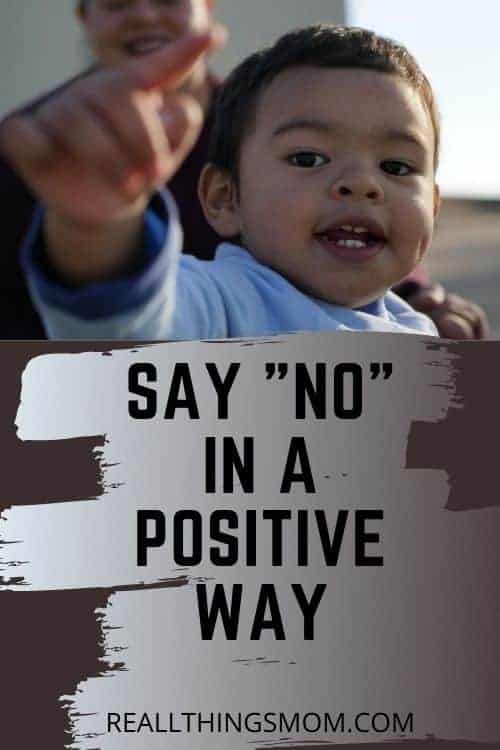
Recently, I wrote about the need for children to hear the word “no,” but I wanted to address the other side of that…and then I got sidetracked, as I usually do! My brain is not what it used to be! So, Part Two of the great “Say No Debate” is that many children hear the word, “no” far too often. I also wrote about the importance of saying, “yes” when you can because of that very issue, but there are positive ways to say, “no” to a child too! I know! It’s a lot to keep track of, but we’ll sort it out.
It’s really not as contradictory as it seems, but rather, it all works together. There’s a definite time and a place for a firm, “No.” And that is part of raising healthy children. Other times, you may not want a child to do something, but you can phrase it in a different way that gives the child a bit more control to make a choice. Using positive ways to say no to a child is also a part of raising healthy children. Then, there are times that we just want to say, “No,” because it’s more convenient or easier for the parents. Those are the times we maybe need to say, “Yes” a bit more often. Yes! Parenting is complicated!
It is also worth mentioning that some kids just need to hear the word “No” more often. My bookends (oldest and youngest children) hear, “No” far more often than my middle two, simply because of the questions they ask! “No, you may not use your grappeling hook to repel from the roof!” (Real question!) “No, you may not pinch, kick, or pull your sister’s hair when you’re angry.” (Yes, she truly asked!) But I knew I was probably saying, “No” too often when my daughter started her questions like this, “You’ll probably just say, ‘no,’ but could I…?”
So, let’s look at that middle—when you need to say, “No,” but it’s not a clear-cut, black and white issue–the positive ways to say, “No” to a child. Maybe it will clear things up!
5 Positive Ways to Say, “No” to a Child Without Actually Using the Word:
- Ask, “Well, how would you feel if…?”—
It seems like my kids are always asking, “Can we watch something?” Ugh. We limit screen time pretty tightly, so the answer is most often, “No”, especially in our very limited summer months! Instead, I might say to my younger two, “Well, how would you feel if you gave your friend a gift—something really fun to play with, but she ignored it because she wanted to watch TV instead?”
And then explain, “God gave us the gift of a beautiful day! Let’s not ignore it to watch TV!”
Let me tell you, as a non-outdoorsy girl, I’m a little convicted as I write those words! Definitely something I need to ask myself sometimes when I just want to be alone in the house!
- Ask, “What Is the Best Thing to Do?”—
Most often, your kids know how you feel about the issue they’re asking about. They know they might have a chance that you’ll say, “Yes,” but most likely, the answer will be, “No.” Otherwise, they wouldn’t ask! Your children don’t come and ask every time they need to do the things that are a definite, “Yes!” They don’t ask, “Can I play with my toys?” when it’s playtime. They don’t ask, “Can I please eat all my food?” when it’s time for dinner. So, for the most part, when children are asking questions, it’s because they already know the answer will probably be, “No.”
This is a great opportunity to flip things around and get them to think for themselves. Using the same scenario from above, if your child asks, “Can I please watch TV?” and it’s a beautiful day to be playing outside, you can ask, “What is the best thing to do right now?” Chances are, she knows the answer is to be playing outside.
Similarly, if your child asks, “Can I please be done with my food?” even though she’s taken three bites, you can ask, “What is the best thing to do right now?” Her answer will probably be, “I know I need to finish my food.”
This doesn’t work with natural-born negotiators well, so use this with caution! If you have a lawyer-child, she will answer, “Of course watching TV right now is the best thing to do and here’s why:” and then lay out a compelling argument that you may not be prepared for and soon, that child will be watching TV! So, know your child and use with caution!
- Offer an Alternative—
If it’s a beautiful day and your child asks to watch TV inside, you can offer an alternative, like, “It’s a beautiful day outside to play, but if you insist on being inside, let’s find something else to do.” You could offer to play a game inside, or with toys.
You can also offer to join her outside with something fun to make it more appealing! I often say, “Oh! I was just going outside to play!” Usually, my kids are happy to join me for some outdoor fun!
There is an alternative to most situations. If there’s not an alternative, or if your child starts to argue about it, then that’s a time to just offer a firm, “No.”
- Sing!—
You know me and singing! I just make up lyrics to tunes for whatever the situation is. In the case of wanting to watch TV on a beautiful day, I might sing, “It’s a beautiful day in the neighborhood, a beautiful day to play, but you would not like to play, did I hear you say? You’d rather rot your brain?” And instead of anger, I usually am met with giggles!
I still do this with my teenagers and they usually can’t help but laugh when I rap like a TOTAL WHITE MOM and half the time, I can’t think of anything that rhymes! I’m telling you, if your kids don’t think you’re weird sometimes…your kids are missing out!
- Use Imagination—
This is my favorite. Instead of saying, “No” to watching TV, you can say, “Let’s use our imaginations!” Then, you can lead your child in a game of pretend. You can invite her outside to pretend to watch TV. You can ask her to be in the TV show!
When my sons were little, the Nintendo Wii came out. Of course, it seemed like everyone had a Wii except us so my kids had played it at friends’ houses and eventually, at my parents’ house. One night, our oldest son organized a Wii night. Seriously, my husband and I pretended to have controllers while he acted like Donkey Kong on the screen. We all took turns at playing the game and at being the characters and it was SO MUCH BETTER than sitting on the couch playing Wii!
If your child wants to be done with her dinner and hasn’t eaten, you can say, “Hmm…what would happen if your peas turned into M&Ms? Would you have room in your tummy for them? Or if you wait too long to eat them, what if they turned into frogs and you still had to eat them?!”
This way, instead of saying, “No, you can’t be done yet.” You say, “Better eat up!”
You get the idea. There are many positive ways to say, “No” to your child that don’t fill your child’s head with negativity all day. There is definitely a time and a place for a firm, “No” and there are benefits to your child hearing it! But if it’s an overused word, it loses its effectiveness. So, here are the basics again:
- Say “Yes” when you can.
- Use an alternative, positive phrase for “No” when you can’t say “Yes.”
- Say, “No” when you need to—it has its own set of benefits!
RElated: Say “Yes” More Often
RElated: Why Children Need to Hear the Word, “No”
